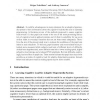7 search results - page 1 / 2 » Assessing Cognitive Load in Adaptive Hypermedia Systems: Phy... |
AH
2004
Springer
13 years 10 months ago
2004
Springer
Abstract. It could be advantageous in many situations for an adaptive hypermedia system to have information about the cognitive load that the user is currently experiencing. A lite...
ICALT
2009
IEEE
13 years 2 months ago
2009
IEEE
Eye-tracking measurements may be used as a method of identifying users' actual behavior in a hypermedia setting. In this research, an eye-tracking experiment was conducted in...
AAAI
2006
13 years 6 months ago
2006
The Infrastructure of modern society is controlled by software systems that are vulnerable to attacks. Many such attacks, launched by "recreational hackers" have already...
CSCW
2008
ACM
13 years 6 months ago
2008
ACM
This article presents a rational model developed under the distributed cognition framework that explains how social tags influence knowledge acquisition and adaptation in explorat...
HCI
2009
13 years 2 months ago
2009
Responsive Adaptive Display Anticipates Requests (RADAR) is a domain general system that learns to highlight an individual's preferred information displays, given the current ...

